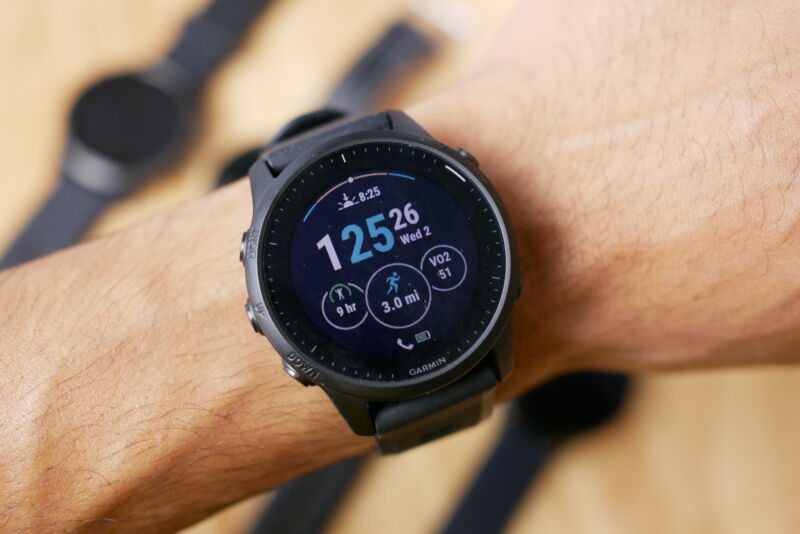
In any event, to help you sort through the holiday shopping noise, we've highlighted a few fitness tracker and smartwatch deals that we think are particularly worth your time below.
Our Cyber Monday Coverage
- All the Very Best Deals
- Deals Under $60
- 3 High-End Home Gym Deals
- Noise-Canceling Headphone Deals
- Smartwatch and Fitness Tracker Deals (You are here)
- Video Game Deals
- Apple Deals
- All Our Cyber Monday Guides
Ars Technica may earn compensation for sales from links on this post through affiliate programs.
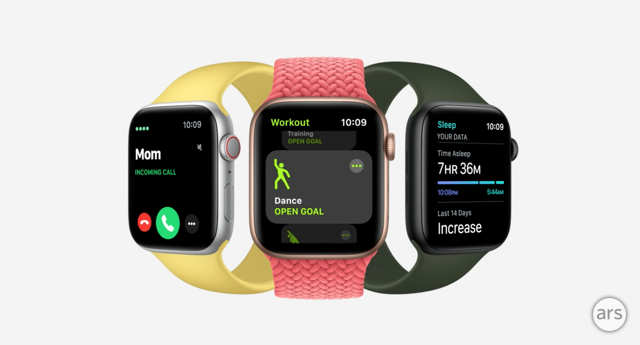
Apple Watch SE for $220 ($279) at Target, or $240 Amazon (or $279 with a $50 gift card at Apple)
Apple Watch Series 6 for $300 ($340) at Walmart
Apple Watch Series 7 for $380 ($400) at Amazon
The new Apple Watch Series 7 (on sale for $380) tops our list as the best smartwatch you can buy, but the Apple Watch SE is the next best option.
The Series 7 has 2X faster charge times, a QWERTY keyboard for text input, and a bigger screen that allows for three larger font sizes—a potential gamechanger for those with low vision. The Apple Watch SE also lacks the always-on display and more advanced health features (electrocardiogram (ECG) support, blood oxygen monitoring) of the Series 7 and Series 6, but it does have GPS, optional LTE, and music storage. It's still a device you can confidently use to leave your phone at home. Apple Watches aren't necessarily the best fitness trackers available, but there are more than 50 different activity-tracking modes, ranging from dancing to ebiking and everything in between. The main draw of Apple Watches is watchOS's wide app compatibility, which brings most, if not all, popular smartwatch apps right to your wrist.
This deal price of $220 is the best we've seen for the SE to date. The Series 7 is new, so it's nice to see any discount on it.
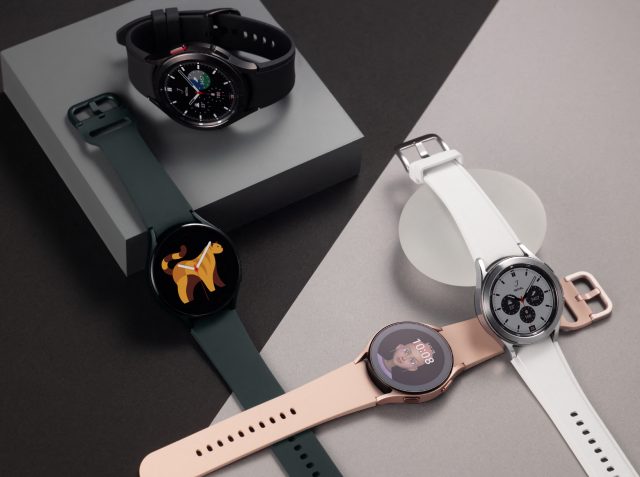
Samsung Galaxy Watch 4 for $200 ($250) at Amazon, Target, Best Buy
The Galaxy Watch 4 is our top pick for Android smartwatches. It runs the latest version of Wear OS, which is now a joint venture between Google and Samsung. That means it now has much wider app compatibility than older Galaxy Watches that used Samsung's Tizen OS. It works well as a fitness tracking tool with ECG (Samsung phones only), heart rate, blood oxygen, GPS, optional LTE, and onboard music storage.
We're pretty used to seeing Galaxy Watches sell under their MSRP, so this deal may stick around longer than just Cyber Monday. But if you're looking for the best Android smartwatch for the holidays, look no further.
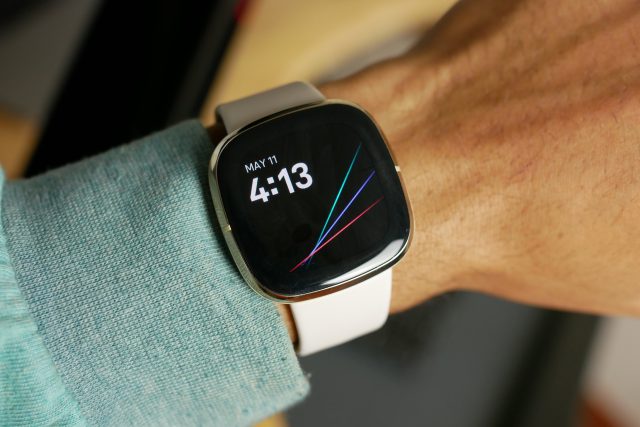
Fitbit Sense for $190 ($270) at Amazon ($200 at Target, Best Buy)
Fitbit's Sense is our second favorite non-Apple smartwatch. With ECG, GPS, EDA (electrodermal activity, for stress measurements), SpO2 (blood oxygen), and the requisite heart-rate sensor all in tow, the Sense has your vitals covered. Those are all the same sensors (plus one, EDA) that the Apple Watch Series 7 has, and it also comes with six months of Fitbit Premium. We still don't find the Sense to be the best pure fitness tracker: you can't store music on it, and activity tracking can be a bit overzealous and somewhat misleading.
That said, having compatibility on Android and iPhone devices and a market-leading bevy of health sensors makes the Sense a good buy at its typical price and an even more compelling deal at $200—the lowest price we've tracked for it.
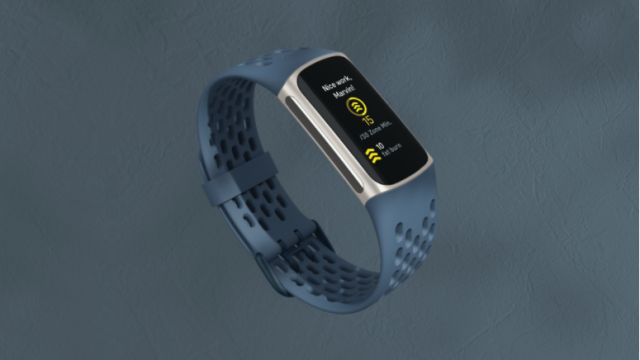
Fitbit Charge 5 for $130 ($175) at Amazon, Target, Best Buy
The Fitbit Charge 5 is the company's best value device, and this price cut to $130—the lowest since its release—makes it one of, if not the best fitness tracker you can get at this price. The device also includes six months of Fitbit's Premium service for more exercises, insights, and health tips. The charge has all the same sensors as the Fitbit Sense (EDA, ECG, SpO2, GPS, HR) but comes in a more rectangular wristband form. You won't be able to control music or use any voice assistants like you can on the Sense, but if you like the Charge 5's style, $130 is a relatively low barrier of entry to this level of tracking and smartwatch functionality.
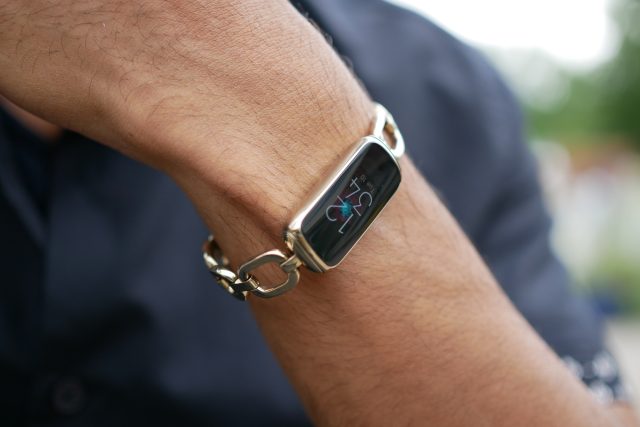
Fitbit Luxe for $100 ($150) at Amazon, Target, Best Buy
Fitbit Inspire 2 for $60 ($95) at Amazon, Target, Best Buy
For those looking to take the first steps on their journey to improved fitness, either the Fitbit Inspire 2 and Fitbit Luxe can be an ideal companion. The Fitbit Luxe is, for my money, one of the best-looking fitness trackers available, especially with the gorjana bracelet accessory (which is sold separately). It's essentially a dolled-up Fitbit Inspire 2 with half the battery life—five days, versus 10 on the Inspire. The main reason for that battery disparity is the Luxe's vibrant OLED display, which, unlike the grayscale Inspire 2, is in full color.
Both devices come with trial periods of Fitbit Premium (a year for the Inspire 2, six months for the Luxe), which means they bring along more than 200 workout videos to choose from, as well as content for mindfulness and meditation. As you dive into the world of wellness, the devices track your heart rate during sleep and exercise. That data is used to inform one of Fitbit's newest Premium features: Daily Readiness. This assesses your workouts, sleep, and recovery to help you determine how prepared you are to exercise on a given day (or at least how prepared Fitbit thinks you are) and recommend particular workouts for the rest for the day.
Much like their more pricier Fitbit siblings, both the Luxe and the Inspire 2 have dedicated tracking modes for a variety of activities, including sleep, runs, strength training, yoga, cycling, pilates, kickboxing, and more. However, neither device has built-in GPS, EDA, or ECG support. They both lack blood oxygen monitoring, too, though Fitbit says the Luxe should soon support it.
Regardless, the Inspire and Luxe are good values for casual fitness trackers at $60 and $100, respectively. The former deal is $3 off the best price we've tracked, while the latter matches the all-time low. The main decision you have to make is whether the Luxe's looks are worth the price increase to you.
reader comments
43